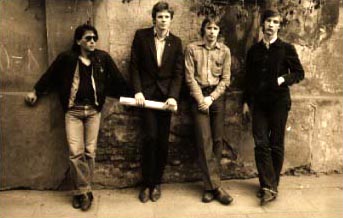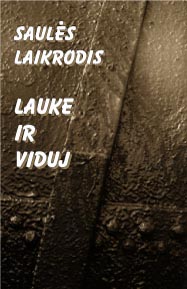
Soviet officials always hated and fought against rock'n'roll. Really hard times began in 1972 after the act of political self-burning and following youth riots in Kaunas, the second biggest city of Lithuania. All public appearances of rock bands were banned, rehearsal studios, even the smallest, closed, musicians were thrown out of the schools and colleges. Underground gigs were raided by police, who smashed equipment and beat up the audience. The lively and extensive rock'n'roll movement was killed.
SAULES LAIKRODIS and a couple of other bands broke through those Dark Ages but only at the end of the 70s. They played some punk covers in their early days, but progressive rock was definitely their chosen style. Despite some of them being trained choir singers, the position of lead vocalist was vacant. The lack of singing kept them from the popularity that any real rock band could have had at those times, but they avoided the unpleasant procedure of official texts' approbation and the inevitable problems that follow.
The only way to be a professional, i.e. have the right to be paid for concerts and to make recordings at the state-owned studio, was to sign a contract with the state concert agency. SAULES LAIKRODIS could not even dream about that, but one elder, recognised composer and sax player Mr. Voronov recovered from heavy drinking and decided to make a comeback at that time. He saw SAULES LAIKRODIS and took them to the Philharmonic (functioning as the local concert agency) as his backing band. The guys had a chance to improve their professional skills, learned to play jazz-rock and had more or less normal living for some time. Neither prog-rock nor fusion could have commercial success, so Mr. Voronov's drinking problems returned and he had to quit, leaving the boys alone. Every ‘philharmonic’ pop band was expected to earn money for the Soviet executives and for other, ideologically correct but unpopular artists. On the other hand, there was a strict regulation, that 90% of the repertoire had to be ‘works of the Soviet composers’. This secured ‘correctness’ of the concert programs and income for the members of the Soviet Composers Union, a kind of state controlled communist Tin Pan Alley. No one from SAULES LAIKRODIS belonged to the union, of course. Instead of silly love songs, the band tried to find a compromise with the authorities preparing a program of modern academic pieces, composed by the young progressive Lithuanian composers. But there are only a few places to perform serious music in Lithuania, so this project was not profitable and the band soon stopped playing it.
SAULES LAIKRODIS felt that their time as a ‘philharmonic’ band was coming to an end. They prepared a new program of original songs and instrumental pieces. The band played perfectly and executives couldn't throw them out without a cause. So it was said that ‘the band propagated nihilistic ideas alien to soviet culture’ and SAULES LAIKRODIS was banned. The guys had had more than enough and saw no sense in continuing on the underground level. Their music was too sophisticated for the dumb Soviet audience. Enthusiastic but rather a small number of fans could not secure an economical basis for SAULES LAIKRODIS existence. The band split. Its members played in almost all better 80s Lithuanian rock bands. Influential Moscow rock critic Artiom Troicky, the author of the best-seller about the history of the Soviet rock'n'roll Back in the USSR credited SAULES LAIKRODIS as one of top five Soviet bands of that time. In native Lithuania they are still regarded as one of the best bands ever and undisputedly the most important band of the early 80s Lithuanian rock.
The album Lauke ir viduj (Outside And Inside) shows us the middle period of their activity. It was their second recorded project, planned for release on LP by Melodya. After the infamous ban caused by the collapse of the third program the release plans were stopped. SAULES LAIKRODIS had numerous side projects. They can be heard as the backing band on the famous local folk rock singer Simas’ Melodya EP. Live recordings of modern academic pieces survived only in very poor quality, but there are some pop songs recorded together with internationally famous boys choir AZUOLIUKAS. Fragments of the first instrumental program of SAULES LAIKRODIS were recorded live by the Lithuanian radio on various occasions, but they can't give an adequate picture of SAULES LAIKRODIS performance quality and the lights and laser show that were so unique for those times.
SAULES LAIKRODIS Lauke ir viduj album is a part 4 of the archive Lietuvos rokas (Lithuanian rock) series released by Zona/BMK. The series try to re-animate elder unpublished and often previously forbidden recordings by the main Lithuanian rock performers from its history of more than 25 years.
|
 |
|
 |